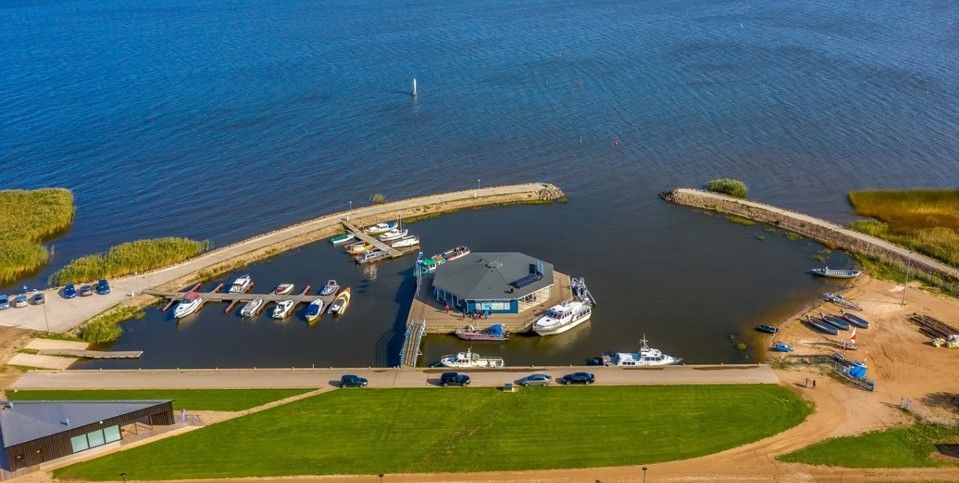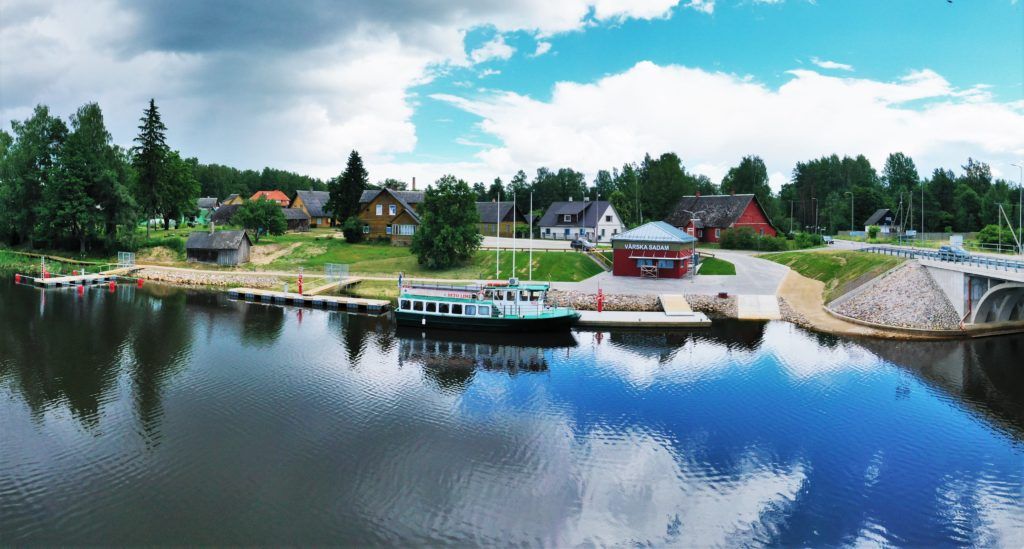When a lake builds communities’ life
Lake Peipsi is a unique water body. It is the biggest transboundary lake in Europe shared by Estonia and Russia. For more than a decade this natural resource has been a focal point for any cross-border initiative between the two countries. Can one single CBC project improve lake water quality, boost local businesses, empower neighbouring communities and even set milestones for re-establishing water connections between two countries? Yes, it can! Meet the project “Common Peipsi” co-funded by Estonia-Russia CBC programme.
Cleaning its waters, building its infrastructures: for cross-border communities, lake Pepsi is the centre of environmental and development efforts. Out of over 300 km of the common border between Estonia and Russia, around half runs along Pskovsko-Chudskoe lake or lake Peipsi. “Whatever is being done in our border regions, is done within the lake basin. The areas of our common activities are quite varied: tourism, ecology, territorial development, transport… This region is one of the most interesting places between Estonia and Russia, worth of particular attention”, – says Maria Bulatova, deputy head of the international and interregional relations department, Committee for economic development and investment policy of the Pskov region.
The idea of the Common Peipsi project was born more than 10 years ago when the Estonian and Russian local and regional authorities sat around the table to discuss own concerns and ideas. Though thematically diverging, their ideas were linked geographically to the same topic: the lake. This is how the first phase of the project (2011-2014) was born. The common interest in turning the lake area into a clean and attractive place, determined the two key-strands of action.
 The Russian partners were concerned with urban waste waters discharged into the lake basin. Local wastewater treatment facilities had been built in the 1960s and were either degraded or unable to process the increased amount of discharges. The partners reconstructed the plants in the small municipalities of Gdov, Cheryokha and Leschikhino located on rivers outflowing into the lake. The decrease of the discharge load through the Velikaya river was ensured, as well thanks to investments in the wastewater treatment plant of Pskov.
The Russian partners were concerned with urban waste waters discharged into the lake basin. Local wastewater treatment facilities had been built in the 1960s and were either degraded or unable to process the increased amount of discharges. The partners reconstructed the plants in the small municipalities of Gdov, Cheryokha and Leschikhino located on rivers outflowing into the lake. The decrease of the discharge load through the Velikaya river was ensured, as well thanks to investments in the wastewater treatment plant of Pskov.

Whereas in Estonia, small harbours were put in the spotlight. Being extremely popular among water tourists and sailors, Lake Peipsi did not dispose yet of an adequate infrastructure to accommodate people and provide boat maintenance. It also lacked the conditions to collect waste and discharges. Three harbours were constructed in Tartu, Mustvee and Räpina with new pavilions, stationary and floating piers, boat storage areas and car parks. Kallaste harbour received new facilities for boat repair and maintenance. All harbours were enabled to treat cargo residues and ship-generated waste.
“We actually targeted two objectives within one project: economic development and environmental protection. By reducing waste in the harbours and decreasing urban discharges, we minimise the human impact on the lake and preserve its eco-system. A clean and beautiful lake attracts more domestic and foreign tourists, which boosts local business. Yet, tourism must be eco-friendly and sustainable too. We often say that lake Peipsi is a unique ECO-system in which both components – ECO-logical and ECO-nomic – should work in harmony. That is why our project is entitled “Economically and Environmentally Sustainable Lake Peipsi area” – there is not a single extra word in it” – continues Maria.
 In the current second phase of the project (Common Peipsi II) the partners are moving beyond. The improvement of Pskov wastewater treatment plant continues with the repair of the aerotank system. Conditions are also created to produce own biological sludge. “This is an organic way to treat the waste waters flowing into our plant. We want to start growing this sludge ourselves, to always have a sufficient quantity at hand, – continues Maria. – The next segment of work is the treatment of the sediments resulting from the neutralization of waste waters. We are replacing there the decanter system which dries the sediments and prepares for further recycling.” The project partner, Pskov wastewater treatment plant “Gorvodokanal”, is testing best practices and solutions to be shared with small local treatment facilities in the region. Another step forward is the completed construction of a new water purification station in Cheryokha village. The project plans to develop technical documentation for two more similar stations in Russia which will be built using national funds – the way to ensure the long-term impact of the project.
In the current second phase of the project (Common Peipsi II) the partners are moving beyond. The improvement of Pskov wastewater treatment plant continues with the repair of the aerotank system. Conditions are also created to produce own biological sludge. “This is an organic way to treat the waste waters flowing into our plant. We want to start growing this sludge ourselves, to always have a sufficient quantity at hand, – continues Maria. – The next segment of work is the treatment of the sediments resulting from the neutralization of waste waters. We are replacing there the decanter system which dries the sediments and prepares for further recycling.” The project partner, Pskov wastewater treatment plant “Gorvodokanal”, is testing best practices and solutions to be shared with small local treatment facilities in the region. Another step forward is the completed construction of a new water purification station in Cheryokha village. The project plans to develop technical documentation for two more similar stations in Russia which will be built using national funds – the way to ensure the long-term impact of the project.

On the Estonian side of the lake the reconstruction works were expanded to three more small harbours: Vasknarva, Luunja and Värska. The infrastructure improvements touched harbour buildings and service facilities for water tourists (washing rooms, sauna, meeting rooms, outdoor kitchen), stationary and floating piers, parking lots and garbage disposal facilities. “Last summer we opened the barge workshop complex in Lodjakoda harbour (Tartu): a museum, an exhibition site and a shipbuilding centre for old wooden ships. This place has become very popular, people would come here for seminars, meetings and even parties” – says Helena Musthallik, the project coordinator.
The project partners actively share their experience with each other. Following the example of the Estonian colleagues, within the Common Peipsi II project, the first river port was built on the Russian side – in Tolbitsa village. The port will help to increase the number of passengers to the Talab islands – a popular destination for eco-tourists, water tourists and pilgrims. Two 30-seat motorboats purchased by the project, new floating piers and storage facilities, will establish a regular two-way connection to the islands and increase tourist flows.
“By building the port, we also create pre-conditions to boost local business activities, – remarks Maria. – The port’s infrastructure includes the possibilities for a parking lot, catering facilities, event spaces. Outside of the project we are already building a regional road towards the port. All this creates a favourable economic environment for the local community and has a long-term impact: new working places will help to retain local population from migrating to big cities.”
To attract local inhabitants and tourists the partners have planned several big promotional events. In July “Lake Peipsi Festival” will unite all Estonian harbours around the lake. Each day interesting activities will take place in each harbour: fish catching workshops, culinary trainings, sailing, hand-made trade, dancing, local food and drink tastings. Likewise, A Fisherman’s Day will be celebrated in the first week of July in Russia. Around the Tolbitsa port, the partners will organise a lab of regional cuisine with fish soup cooking show, fishing competitions and concerts. Another similar promo event – Food Festival – is meant to close the Estonian Food Street in a circle around the lake.
Even if the project has achieved a lot, the partners’ plans go well beyond one single programming period. Common Peipsi is pursuing a bigger dream: “The Estonian and Russian authorities are discussing the possibility to re-establish water connection between the two countries on lake Peipsi. Having good harbours on the Estonian side, and now also a good harbour in Pskov, we hope to connect them one day. Many people are looking forward to re-establishing the links which existed in the Soviet times” – explains Helena.
The Common Peipsi project is unique, not only by its scale or geography. It is hard to imagine a more ambitious, multi-objective project with long-term impact in so many sectors. But above all, unique are the relations of trust, friendship and mutual support built through over a decade of cooperation between the neighbours on both shores of the common lake.

